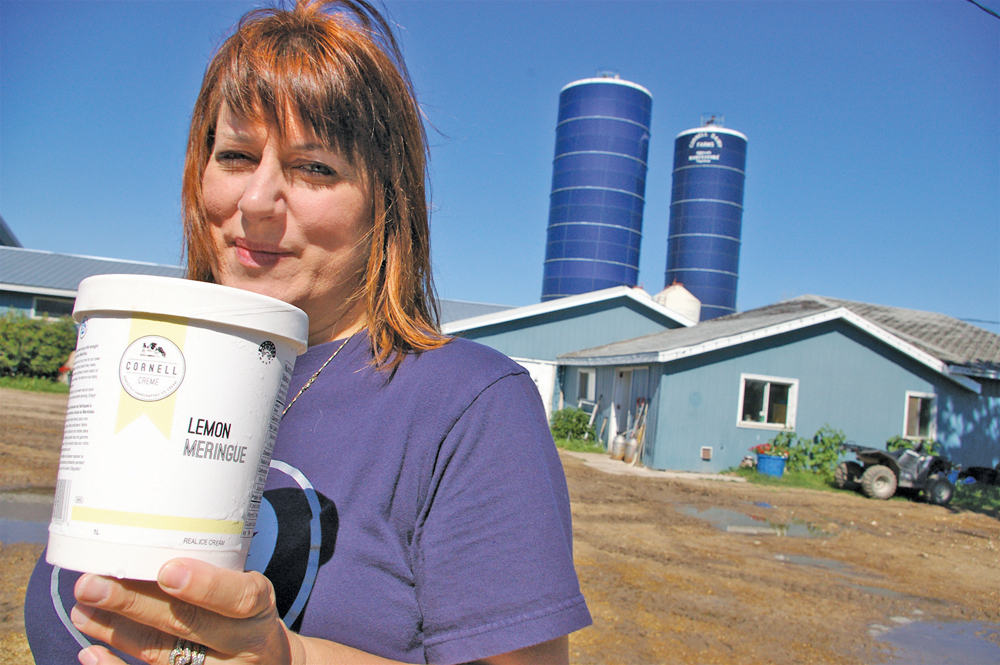More niche and specialty made-in-Manitoba products will catch the eye of customers with the launch of 60 additional new products through the provincial Buy Manitoba program.
The Manitoba Food Processors Association (MFPA) has helped Red River Co-op stores in Winnipeg link up with more than a dozen local food companies.
It means new exposure for 17 additional food processors and more awareness for consumers about the food products being created right here at home, said MFPA staff.
“Our goal is to put more Manitoba food on Manitobans’ plates, and our new partnership with Red River Co-op is assisting us in making a huge leap in that direction,” said Jennifer Strath, manager of the Buy Manitoba program.
The Red River Co-op unveiled its Buy Manitoba initiative on its first anniversary after buying four grocery stores from Canada Safeway last spring.

The stores will now carry made-in-Manitoba products such as the gourmet dips and sauces of Bessie’s Best gourmet dips and sauces, new dairy products such as Cornell Creme specialty ice creams, and a fresh soft cheese maker Dairy Fairy, plus products from companies such as Neva Hydroponic Farm and Prairie Flour Mills.
Smak Dab Gourmet Foods is another new product line on the Co-ops’ shelves. It’s a big leap forward for the entrepreneur who created them. Carly Minish made her debut as a Manitoba food maker only last summer at farmers’ markets.
“Buy Manitoba has been an especially important program for new companies like me, with advisers who have helped me navigate the ins and outs of running a food business,” said the young mustard maker.
Read Also

Cooking fish of Manitoba: Keep your catch fresh and tasty for the table
Fishing in Manitoba provides mouthwatering meals, assuming anglers handle, process and cook their fish properly before sitting down to eat. Here’s how, with recipes and fish preparation tips.
The 300-member MFPA, a not-for-profit industry-run association, administers the Buy Manitoba program, which was rolled out in 2012 at Canada Safeway in Winnipeg. The main goal of the program is to help consumers easily identify made-in-Manitoba foods on store shelves and encourage more purchasing of processed and fresh Manitoba foods.
“One of the key reasons we are keen on helping companies get established in the Manitoba market is that it prepares them to pursue markets in the rest of Canada and potentially export markets,” said Dave Shambrock, MFPA executive director.
Approximately 120 Manitoba companies now participate in the Buy Manitoba program.
In the first two years of operation, Buy Manitoba has resulted in incremental cash register sales amounting to about $7.4 million, and an overall sales increase of about five per cent annually for the top 25 participating companies.
“Are we happy about that? Deliriously so,” said Shambrock. “A half a per cent increase in sales in our industry is huge.”
There’s potential for more uptake by more companies too.
“It comes down to how many companies in the province that are capable of selling to grocery stores. There’s a lot of discussion about that,” he said. He estimates there’s probably about 250 or more businesses that could be supplying larger stores.
This partnership forged with Red River Co-op, and MFPA working with its stores to match their product needs with Manitoba companies that could supply them is one of the ways the Buy Manitoba program is now evolving, Shambrock said.
Beyond a promotions and awareness campaign, staff supporting Buy Manitoba are now putting more time into helping small food businesses grow, he said. Eventually it would like to have programs in place to help new startups and small to medium businesses deal with the complexities of the regulatory operating environment too.
“Companies need help on all fronts, they need help with their product, with their package design, their promotion campaign, and for sure they need support in terms of regulatory understanding,” he said.




















